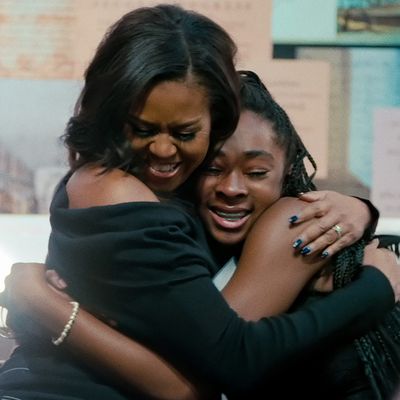
It’s during the Atlanta stop of Michelle Obama’s book tour that Gayle King, one of the slate of celebrities who were enlisted to serve as moderators along the way, asks about “When they go low, we go high.” “I’m assuming you still maintain that and still believe that,” King says of the phrase that became attached to the former First Lady like a slogan. “I try. We’re only human,” Obama replies, allowing just the slightest hint of abrasion into her voice. “When you’re president of the United States, words matter. You can start wars, you can crash economies, there’s too much power to be that careless. And so that’s how we operated. We had to be bigger and we had to go high. The higher up you go the higher up we have to be.”
That’s the closest that Becoming, a surprise streaming drop that was announced in late April, gets to overt criticism of the current administration. The documentary is a sleek and generally self-celebratory affair — the third title to come out of the deal Netflix made with the Obamas by way of their production company Higher Ground, and the first to focus on the family and to serve primarily as postpresidential brand building. Becoming, directed by Nadia Hallgren, follows Michelle Obama as she travels the country in late 2018 and early 2019 on behalf of her memoir of the same name. Autobiographical details from the book are brought to the screen by way of interviews with Obama, her mother Marian Shields Robinson, her brother Craig Robinson, and, oddly, a member of her security detail. Barack Obama remains supportively on the sidelines, making a cameo during an event but otherwise ceding the spotlight and the focus to his spouse.
If the story of Trump’s rise is that of the entertainment world being brought into a Melancholia–style collision with the political one, Becoming is a snapshot of a couple moving in the opposite direction. “Barack and I aren’t interested in being at the forefront forever — not even for that much longer,” Obama notes at one point, and the film feels very much like an artifact of the Obamas’ attempted retreat from the global stage in favor of private lives producing socially relevant nonfiction films. Becoming is an act of legacy burnishing, no doubt, but it doesn’t feel like it’s laying the groundwork for a future campaign from its subject, not matter how adored it makes her look. Instead, it’s more of an insistent feature-length case for the family having done, and given, enough.
A shot of Obama coming out in gold Balenciaga boots, for instance, is shown in contrast to footage about criticism of her looks and style choices while in the White House. Clips of birther protests and Fox News vilification play against her sparing admission that these things hurt, that it “changes the shape of a person’s soul.” Much of Becoming is about the brutal nature of and the toll exacted by the scrutiny that comes with the highest office in the land — how hard it was to weather the judgments, the racism, the threats, and the need to always rise above, and what a relief it is to be loosed of those burdens. And the greatest liberty the film revels in is opting not to engage with the realities of the successive presidency, even when Obama is asked about it by one of the students she meets with in groups throughout her tour. There’s no more eloquent, if disappointing, flex of power than the film’s refusal to really engage on the topic lurking at its edges like a stalker pointing out the sidewalk he’s standing on is technically public property.
Late in the film, Obama says that her own trauma has more to do with how many people, especially the young, didn’t show up to vote at all. It’s on them that she bestows responsibility for the future at the end, wading into a sea of tender-age supporters who appear to be pining, the way a lot of viewers of this doc surely will be, for encouragement and a dollop of nostalgia. Fittingly, it’s a young person — Malia Obama — who provides a glimpse of what might lay beneath the strategic new public-facing facade that Becoming presents. “Those eight years weren’t for nothing,” she tells her mother encouragingly when paying a visit after an event. “You see that huge crowd out there and that last speech you gave. People are here because people really believe in love and hope and other people.” They’re words that hint at despair and anger that the camera will never see, because, as the film makes clear, those cameras have already been shown enough.
More Movie Reviews
- Fernanda Torres Is a Subtle Marvel in I’m Still Here
- Grand Theft Hamlet Is a Delightful Putting-on-a-Show Documentary
- Presence Is the Best Thing Steven Soderbergh’s Done in Ages


